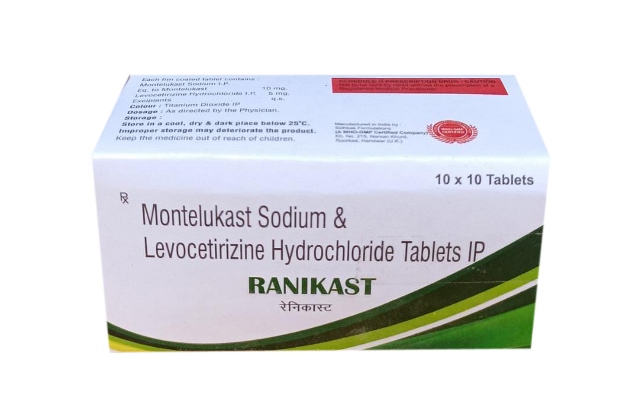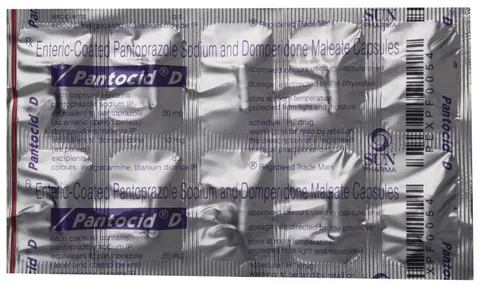Ranikast Tablet
MARKETED BY
Ranip Drugs (India) Pvt Ltd
SALT COMPOSITION
Levocetirizine (5mg) + Montelukast (10mg)
STORAGE
Store below 30°C

PRODUCT INTRODUCTION
Ranikast Tablet is a combination medication prescribed for the management
of allergic symptoms, including runny nose, stuffy nose, sneezing, itching, swelling, watery eyes,
and congestion. Additionally, it helps reduce inflammation in the airways, making breathing easier.
The recommended dosage and duration of Ranikast Tablet should be followed as per your doctor's advice.
The prescribed dose will be determined based on your medical condition and how you respond to the
treatment. It's crucial to continue taking the medication for the entire duration recommended by
your doctor. Stopping the treatment prematurely may lead to a recurrence of symptoms and worsen
your condition. Inform your healthcare provider about all the other medicines you are taking,
as some may interact with Ranikast Tablet.
Common side effects of this medication include nausea, diarrhea, vomiting, dry mouth, headache,
skin rash, flu-like symptoms, and fatigue. These side effects are usually temporary and tend to
resolve over time. If you have any concerns about these side effects, promptly consult your doctor.
Ranikast Tablet may cause dizziness and drowsiness, so it's essential to refrain from activities
requiring mental focus, such as driving, until you understand how the medicine affects you. Avoid
alcohol consumption while on this medication, as it can exacerbate drowsiness.
Never indulge in self-medication or suggest your medication to others. Ensuring an adequate intake
of fluids while on this medication is beneficial. Before starting Ranikast Tablet, inform your
doctor if you have kidney disease.
USES OF RANIKAST TABLET
Treatment of sneezing and runny nose due to allergies
Treatment of hay fever
Treatment of allergic skin conditions
BENEFITS OF RANIKAST TABLET
In Treatment of sneezing and runny nose due to allergies
Ranikast Tablet is a blended medication designed to alleviate symptoms like nasal congestion,
runny nose, sneezing, and irritated or watery eyes. Using this medicine can help you carry out
your daily activities with greater ease. Serious side effects are uncommon, and you might only
need to take it on days when symptoms are present. However, if you are using it for preventive
purposes, regular usage is recommended to achieve the maximum benefits.
In Treatment of hay fever
Hay fever, also known as allergic rhinitis, leads to symptoms similar to a cold, such as a
runny nose, itchy eyes, congestion, sneezing, and sinus pressure. The key distinction is
that hay fever symptoms are not caused by a virus but are instead the body's allergic responses
to allergens (substances that trigger allergies, like pollen). Ranikast Tablet is used to
alleviate these hay fever symptoms. Its mechanism involves inhibiting the release of the
chemical responsible for producing such allergic reactions. Ranikast Tablet is a safe medication
that effectively treats hay fever and provides relief, promoting a sense of comfort.
In Treatment of allergic skin conditions
Ranikast Tablet has proven efficacy in addressing allergic skin conditions characterized by
inflammation and itching. It operates by diminishing the impact of certain chemicals within the
body that trigger skin inflammation. When used as directed, it serves as a secure and efficient
treatment, reducing redness, rashes, pain, or itchiness resulting from skin reactions to irritants.
Consequently, it contributes to enhancing self-esteem and confidence as it brings about positive
changes in one's appearance. To reap the complete advantages, it is essential to continue taking
the medication for the entire prescribed duration.
SIDE EFFECTS OF RANIKAST TABLET
Most side effects do not require any medical attention and disappear as your body adjusts to the medicine. Consult your doctor if they persist or if you’re worried about them.
Common side effects of Ranikast Tablet
- Nausea
- Vomiting
- Diarrhea
- Dryness in mouth
- Fatigue
- Headache
- Skin rash
- Sleepiness
HOW TO USE RANIKAST TABLET
Take this medicine in the dose and duration as advised by your doctor. Swallow it as a whole. Do not chew, crush or break it. Ranikast Tablet may be taken with or without food, but it is better to take it at a fixed time.
HOW RANIKAST TABLET WORKS
Ranikast Tablet is a medication that combines Levocetirizine and Montelukast to alleviate symptoms associated with allergies, such as sneezing and a runny nose. Levocetirizine acts as an antiallergic agent by inhibiting the activity of histamine, a chemical messenger responsible for causing runny nose, watery eyes, and sneezing. On the other hand, Montelukast functions as a leukotriene antagonist, blocking another chemical messenger called leukotriene. This action helps to reduce inflammation and swelling in the airways and nose, leading to an improvement in allergy symptoms.
SAFETY ADVICE

Alcohol
CAUTION
Caution is advised when consuming alcohol with Ranikast Tablet. Please consult your doctor.

Pregnancy
CONSULT YOUR DOCTOR
Ranikast Tablet is generally considered safe to use during pregnancy. Animal studies have shown low or no adverse effects to the developing baby; however, there are limited human studies.

Breast feeding
CAUTION
Ranikast Tablet is unsafe to use during breastfeeding. Data suggests that the drug may cause toxicity to the baby.

Driving
UNSAFE
Ranikast Tablet may decrease alertness, affect your vision or make you feel sleepy and dizzy. Do not drive if these symptoms occur.

Kidney
CAUTION
Ranikast Tablet should be used with caution in patients with kidney disease. Dose adjustment of Monticope Tablet may be needed. Please consult your doctor. Use of Monticope Tablet is not recommended in patients with severe kidney disease.

Liver
SAFE IF PRESCRIBED
Ranikast Tablet should be used with caution in patients with severe liver disease. Dose adjustment of Ranikast Tablet may be needed. Please consult your doctor. Limited information is available on the use of Ranikast Tablet in these patients. No dose adjustment is recommended in patients with mild to moderate liver disease.
WHAT IF YOU FORGET TO TAKE RANIKAST TABLET?
In the event of a missed dose of Ranikast Tablet, take it as soon as you remember. However, if your next scheduled dose is approaching, skip the missed dose and return to your regular dosing schedule. Avoid taking a double dose to compensate for the missed one.




